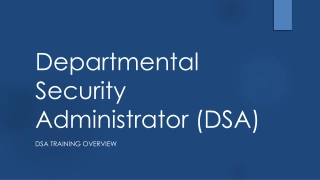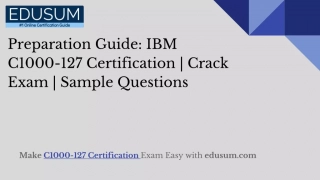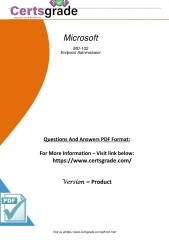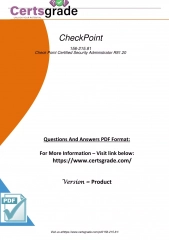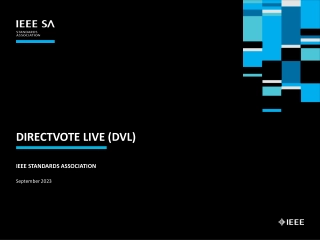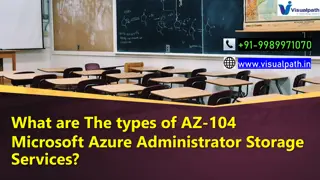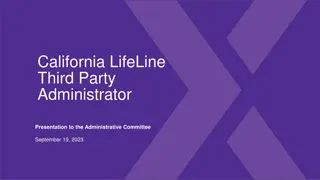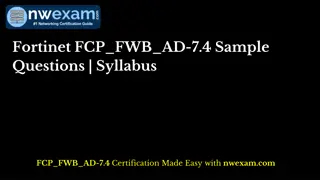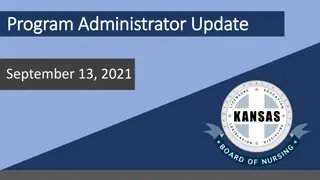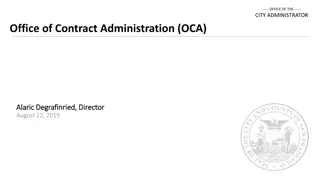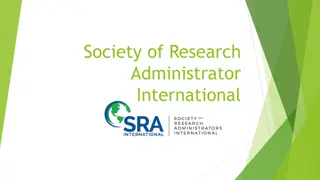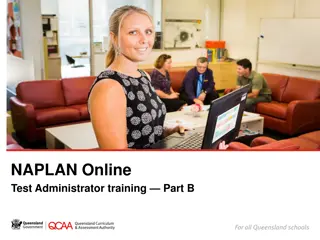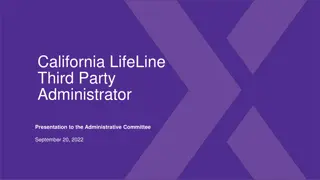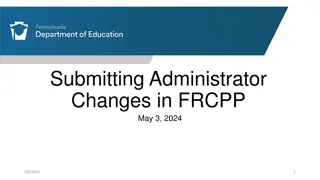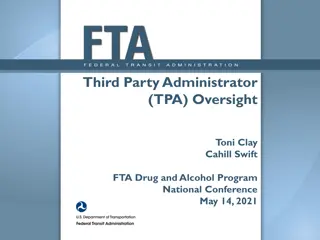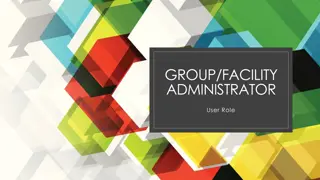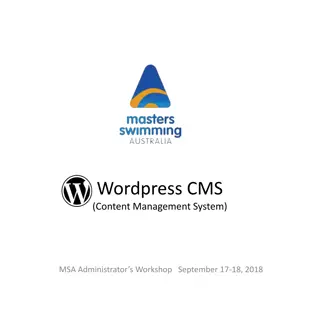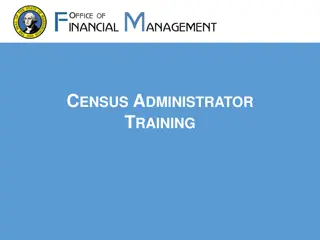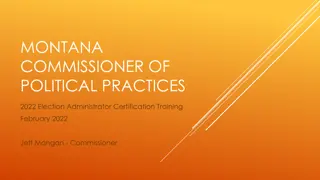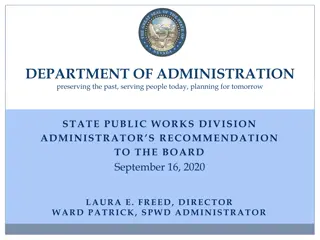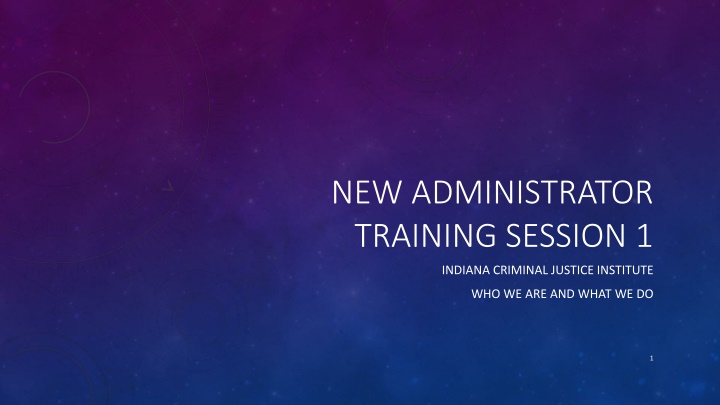
Indiana Criminal Justice Institute Overview
Learn about the Indiana Criminal Justice Institute (ICJI), the state planning agency for criminal justice, juvenile justice, traffic safety, and victim services. Discover how ICJI uses evidence-based decision making to improve the efficiency of the criminal justice system and manages programs such as the Indiana Victim Compensation Program.
Download Presentation

Please find below an Image/Link to download the presentation.
The content on the website is provided AS IS for your information and personal use only. It may not be sold, licensed, or shared on other websites without obtaining consent from the author. If you encounter any issues during the download, it is possible that the publisher has removed the file from their server.
You are allowed to download the files provided on this website for personal or commercial use, subject to the condition that they are used lawfully. All files are the property of their respective owners.
The content on the website is provided AS IS for your information and personal use only. It may not be sold, licensed, or shared on other websites without obtaining consent from the author.
E N D
Presentation Transcript
NEW ADMINISTRATOR TRAINING SESSION 1 INDIANA CRIMINAL JUSTICE INSTITUTE WHO WE ARE AND WHAT WE DO 1
WHAT IS THE INDIANA CRIMINAL JUSTICE INSTITUTE? The Indiana Criminal Justice Institute (ICJI) is the State planning agency for criminal justice, juvenile justice, traffic safety and victim services. The institute develops long-range strategies for the effective administration of Indiana s criminal and juvenile justice systems and administers state and federal funds to carry out these strategies. 2
WHAT DOES ICJI DO? Through the use of evidence-based decision making, ICJI works to improve the efficiency of the criminal justice system, from call for service through post-conviction. The agency accomplishes this by bringing together key leaders from the criminal justice system at the state, local and national levels to identify critical issues facing Indiana. The agency evaluates policies, programs and legislation designed to address these issues. ICJI is designated as the State Administering Agency for distribution of federal funds, and as the State Statistical Analysis Center for research. 3
ICJI has several divisions, of which Victim Services, is one. Other divisions include Behavioral Health, Drug and Crime and Traffic Safety which all provide funding for programming within their respective areas of expertise. WHAT DOES ICJI DO? (CON T) Research and Planning is another division within ICJI. They serve as the research team for the State Administering Agency, utilizing strategic planning to analyze crime trends, evaluating the priorities of all segments of the criminal justice system, setting out a plan for reducing crime and victimization, and guiding the use of grant funds. The team also serves as the Indiana Statistical Analysis Center, conducting objective analyses informing policy and practice at the state and local levels. 4
WHAT DOES ICJI DO? (CONT) The Indiana Criminal Justice Institute manages the Indiana Victim Compensation Program, which works to reduce the impact of crime on victims lives. The program was established to reimburse victims (or their dependents), who have suffered physical injury, for certain costs incurred as a result of a violent crime. Expenses include but are not limited to: medical bills, mental health counseling, lost wages, childcare services, attorney fees and funeral expenses, up to a certain amount. Additional information can be found on the ICJI website. 5
WHAT DOES ICJI DO? (CONT) ICJI s Regulatory Compliance Division is responsible for ensuring that ICJI s partners comply with all relevant Federal, State and agency-specific laws, rules and regulations governing the grant funds that ICJI awards. ICJI does this through policy creation and distribution, training opportunities, and on- and off-site monitoring reviews. When there is a misuse of grant funds or one of the entities that ICJI provides funding to is out of compliance with the pertinent requirements, the Regulatory Compliance Division is responsible for seeking repayment of the relevant amounts, and in certain circumstances, referring issues to the Department of Justice and/or the Indiana Office of Inspector General to conduct further investigations. 6
HOW DOES THE VICTIM SERVICE DIVISION GET GRANT FUNDS AND WHERE DO THE FUNDS COME FROM? Victim Services receives grant funds from Federal and State sources. We have seven main funding sources, five which are Federal funds and two that are State funds. At various times there may be more than one grant effective at a time within these main funding sources. These grants have different grant periods, start/end dates, application periods and qualifications. Federal Funding: FVPSA- Family Violence Prevention Services Act VOCA- Victims of Crime Act STOP- Services, Training, Officers, Prosecutors Grant SASP- Sexual Assault Services Program SSBG- Social Services Block Grant 7
HOW DOES THE VICTIM SERVICE DIVISION GET GRANT FUNDS AND WHERE DO THE FUNDS COME FROM? (CON T) State Funding: DVPT- Domestic Violence Prevention and Treatment Grant SAVAF-Sexual Assault Victims Assistance Fund 8
The FVPSA program is the primary federal funding stream dedicated to the support of emergency shelter and related assistance for victims of domestic violence and their children. The purpose of the program is to: FAMILY VIOLENCE PREVENTION SERVICES ACT (1) assist states in efforts to increase public awareness about, and primary and secondary prevention of, family violence, domestic violence, and dating violence; (2) assist states in efforts to provide immediate shelter and supportive services for victims of family violence, domestic violence, or dating violence, and their dependents. (FVPSA) FVPSA is a program under the U.S. Department of Health and Human Services Family and Youth Bureau, an office of the Administration for Children and Families. 9
FAMILY VIOLENCE PREVENTION SERVICES ACT (FVPSA) Through the American Rescue Plan (ARP), CJI has received supplemental FVPSA funding to help organizations prevent, prepare for and respond to the COVID-19 pandemic. FVPSA ARP: Supplemental funding to prevent, prepare for and respond to COVID-19. FVPSA ARP SA: Supplemental funding to support Sexual Assault survivors across Indiana. The purpose is to: (1) to assist with the transition to virtual/remote services for rape crisis centers, sexual assault programs and culturally specific programs that provide crisis and support services and assistance to sexual assault survivors and (2) to support the increased emergency needs of sexual assault survivors as a result of the COVID-19 public health emergency. 10
Funded by the U.S. Department of Justice Office for Victims of Crime (CFDA: 16.575), the purpose of the VOCA grant program is to provide high quality services that directly improve the health and well being of victims of crime across the state and nation. Crime Victim is defined as a person who has suffered physical, sexual, financial, and/or emotional hardship as the result of the commission of a crime. VICTIMS OF CRIME ACT (VOCA) For the purpose of these program s guidelines, services are defined as those efforts that: 1. Respond to the emotional, psychological, and/or physical needs of crime victims: 2. Assist victims to stabilize their lives after victimization: 3. Assist victims to understand and participate in the criminal justice system; and 4. Restore a measure of safety and security for the victim. 11
SERVICES, TRAINING, OFFICERS, PROSECUTORS (STOP) Funded by the U.S. Department of Justice Office on Violence Against Women, the STOP Violence Against Women Formula Grant Program aims to develop and strengthen the criminal justice system s response to violence against women and to support and enhance services for the victims. The program encourages community partnerships between law enforcement, prosecution, courts and victim services organizations to enhance victim safety and hold offenders accountable in cases of domestic violence, dating violence, sexual assault and stalking. STOP Formula Grant Program for Law Enforcement- Limited to Law Enforcement activities only. This grant supports communities in their efforts to develop and strengthen effective responses to sexual assault, domestic violence, dating violence and stalking. 12
SEXUAL ASSAULT SERVICES PROGRAM (SASP) Funded by the U.S. Department of Justice Office on Violence Against Women, SASP works to support rape crisis centers and nonprofit, nongovernmental organizations that provide core services, direct intervention and related assistance to victims of sexual assault in Indiana. Rape crisis centers and other nonprofit organizations, such as dual programs providing both domestic violence and sexual violence intervention services, play a vital role in assisting sexual assault victims through the healing process, as well as assisting victims through the medical, criminal justice, and other social support systems. 13
The SSBG program works to assist residential domestic violence programs in providing emergency shelter to survivors of domestic violence and their dependents. SOCIAL SERVICES BLOCK GRANT Priority is given to non-profit private organizations that, as their primary purpose, operate shelters or provide counseling, advocacy and self-help services to victims of family violence, domestic violence, and dating violence and their dependents. (SSBG) 14
DOMESTIC VIOLENCE PREVENTION AND TREATMENT GRANT PROGRAM (DVPT) The DVPT Grant Program was created by the Indiana General Assembly in 1992 to support Indiana s domestic violence centers, offer domestic violence training for service providers and expand services to treat and prevent domestic violence. 15
SEXUAL ASSAULT VICTIM ASSISTANCE FUND (SAVAF) The SAVAF program aims to provide a comprehensive statewide response for victims of sexual assault. Funding is awarded to Establish and maintain rape crisis centers Enhance services provided by existing rape crisis centers and, Develop, implement, and expand trauma informed sexual assault services. 16
For the purposes of an ICJI grant, an RFP is a Request for Proposal or a document that announces a grant, describes the requirements and provides critical information about the grant or application to those agencies who may be interested in applying. RFPs are located on the ICJI website: www.in.gov/cji/ On the home page of the ICJI Website, scroll down toward the bottom of the page and you will see the open grants available, and you can also click into the open solicitations box just above the open grants section. You can print or save these RFPs for your records. However, they will remain on the CJI website if you need to refer to it later. WHAT IS AN RFP? WHERE IS THE RFP LOCATED? 17
On the ICJI website you can find information about all the divisions within ICJI Within the Victim Services section of the website, you can find information about the specific grants managed by the Victim Services Division as well as a section called Training Webinars. In this section there are general Training videos and RFP webinars. The first video on this page is Grant writing for Victim Service Grants. This New Administrator video series will be found in this same section of the CJI Website. With the training videos, there are also PowerPoint documents that can be printed and there are also Q&A documents for some of the videos. WHAT CAN YOU FIND ON ICJI S WEBSITE? Also, in the Victim Services section of the website down at the bottom of the page there are two sections one titled Online Services, and the other is Resources. In the Resources box, there is a link for forms. These are forms needed for the application as well as example of time sheets and instructions with forms. 18
WHAT CAN YOU FIND ON ICJIS WEBSITE? (CONT) ICJI s Policies and Grant Management Directives as well as required training can be found on the home page of the ICJI website and toward the bottom of the page in Grantee Training, Resources & Policies. Various reports that the Research Division completes as well as dashboards for various grants that reflects quarterly reports entered by subgrantees. There is a link to IntelliGrants on the home page of the ICJI website at the bottom of the page along with a link to Register someone in IntellIGrants and the Subgrantee User Manual for IntelliGrants. 19
INTELLIGRANTS How to use and how to access your grant Website for IntelliGrants: https://intelligrants.in.gov/login2.aspx 20
INTELLIGRANTS- LOGIN PROBLEMS If you forget your password, you can reset it yourself by clicking Forgot Username/Password. You will have to input the email that is associated with your account. You will receive an email with a temporary password. NOTE: YOU HAVE TO TYPE IN THE TEMPORARY PASSWORD COPY AND PASTING IT WILL NOT WORK! If this approach does not work than feel free to reach out to your Grant Manager or CJI s Helpdesk (cjihelpdesk@cji.in.gov). 21
ANOTHER WAY TO ACCESS AGENCY GRANTS AND INFORMATION Once My Organization is opened there are additional links including Organization Members and Organization Documents. Organization members is where staff who will be doing reporting and writing the applications will be added to have access to the grants. Organization documents is where all the grants are listed and all fiscal and program reports that are approved are located. 26
ACCESSING A GRANT Once the grant hyperlink is selected then the first page that will come up is the Document Snapshot form, which is a summary of the grant and your agency information. 27
NAVIGATING THROUGH INTELLIGRANTS Forms Menu: The forms menu is where most of the work is completed within IntelliGrants. This section contains the forms from your application. 28
Application Forms Contact information Project information Programmatic Information FORMS MENU OPTIONS Problem Statement & Analysis Goals, Objectives, & Outcomes Program Description Evidence Based Practices Use of Volunteers 29
Budget Forms Personnel Employee Benefits Supplies & Operating Expenses FORMS MENU OPTIONS (CON T) Equipment Travel Consultants and Contractors Program Income Budget Summary Budget Narrative 30
Certified Assurances & Special Provisions- is completed during application but no further work is required in this section other than the agency understanding the assurances signed and the special provisions required. Required Attachments- If there are required attachments missing during the application process you will be asked to attach them during the Application Modification step before the grant can be processed through the approval process. FORMS MENU OPTIONS (CON T) Program Modification Request- This will be discussed at length in Session 5, but this is the section that will be used once the grant is executed and any significant changes need to be made to the grant such as moving grant funds from one line item to another, adding of a line item in any section of the budget, etc. 31
Contract- Not much will be needed in this section, however during the grant approval process there is one section that will need to be updated. There is a hyperlink in the Forms menu at the bottom for Grant Agreement. During the grant approval process agencies will be asked to go into this section and select if they want to complete fiscal and program reports monthly or quarterly. FORMS MENU OPTIONS (CON T) Contract Status- Once the grant is executed and a copy of the executed grant is put on the Indiana Transparency Portal, then you should be able to find a copy of the entire grant agreement in the Contract Status section of the Forms menu. If the executed copy is not there, please contact your ICJI Grant Manager for assistance. 32
NAVIGATING THROUGH INTELLIGRANTS Status Changes: In the status change section there will be different options depending on what is being done in the grant at the time. We will discuss status changes when completing a fiscal or program report in a different session. The Status Changes section allows a Subgrantee Administrator or Subgrantee Project Director to change the status at any given time. 33
NAVIGATING THROUGH INTELLIGRANTS Management tools: The Management Tools section allows a Subgrantee Administrator and/or Subgrantee Project Director certain administrative responsibilities. Create full print version: create printable version of your application Create full Blank Print Version: create a blank printable version of an application. Add/Edit People: Manage the people who have access to your agency s grant Status History: View the status history of your application Check for errors: Check the entire document for errors Attachment Repository: View attachments in the application 34
NAVIGATING THROUGH INTELLIGRANTS Related Documents and Messages: The Related Documents and Messages section is where documents such as Program Reports, Fiscal Reports and related messages are found. It is also used to initiate documents such as Fiscal and Program Reports. 35
WHAT ARE THE ADDITIONAL SESSIONS GOING TO BE ABOUT? Session 2: What happens after applications are submitted? In this session we will discuss what happens after the grant application is submitted, what happens once an agency is awarded funds, what is expected after a grant is executed through the end of the grant. Session 3: Fiscal Reporting Session 4: Program Reporting Session 5: Making changes to the grant 36
PRESENTER CONTACT INFORMATION ELLEN SHEETS ESHEETS1@CJI.IN.GOV 37
QUESTIONS? 38

